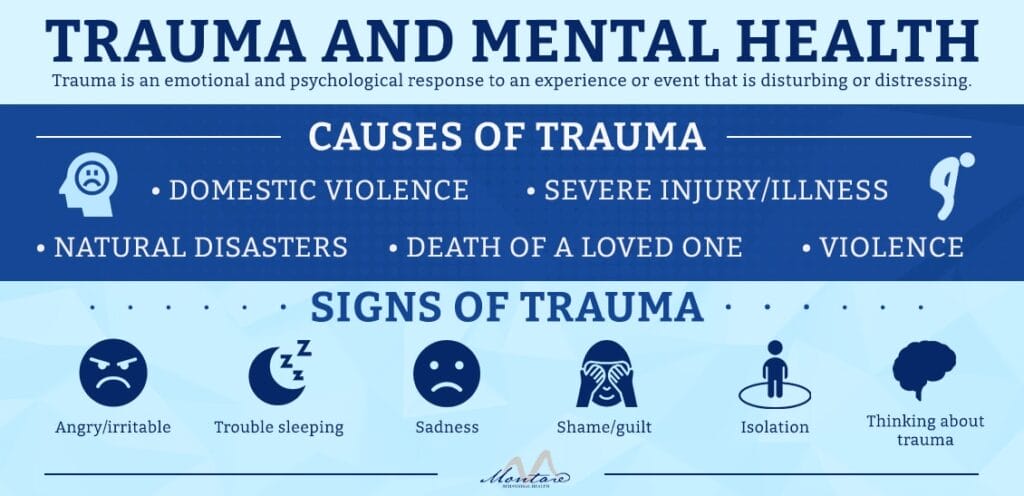- About Us

Get to know us
- Locations
- Treatment

Who We Treat
- Contact Us


Comprehensive behavioral health treatment facilities for adults in a safe and comforting atmosphere in Southern California.


Have you been through something traumatic? If so, you know the effects last long past the actual event. For this reason, help from experts can encourage healing. We provide trauma therapy in Los Angeles, CA that helps you tackle any past and ongoing trauma in your life.
We offer several types of programs. Because of this, people can find the one right for their unique needs. As a result of getting trauma therapy, people can learn to move on. Consequently, they feel happier and less anxious about their lives.
Trauma is an emotional and psychological response to an experience or event that is disturbing or distressing. The impact of traumatic events is so strong that the person carries it around with them long after it’s over. What is more, they need trauma therapy in Los Angeles in order to overcome it. The trauma may have happened recently. Conversely, it could have happened long ago, including during childhood.
Examples of traumatic events include:
People who have been through traumatic events show signs. However, they may find it hard to recognize them. As well, loved ones may not realize how trauma has affected someone they care about. For that matter, the signs may not show up for weeks or months. In short, knowing trauma has taken place can be hard to figure out.
Signs and symptoms of having the effects of trauma include:
Fortunately, experts such as our trauma therapist in Los Angeles can help a person identify if trauma has taken over their lives. With this in mind, they can come up with a plan to treat it.
When trauma happens to someone, it’s painful and scary. But it doesn’t end when the event is over. In addition, living with trauma on a daily basis proves to be hard to do. Montare Behavioral Health provides trauma therapy in Los Angeles, California that helps people dealing with this sad issue. We treat PTSD and other mental health issues that come from trauma.
Contact us now and find out how to get control of your life. Our residential and outpatient programs change how you think and feel. Afterward, you begin to live a more peaceful life.

Montare Behavioral Health




Treatment for PTSD and other trauma disorders can help in many areas. First, the person regains a sense of control over their lives. Second, they learn to manage many of their symptoms. Finally, they understand they have power over how they react. Our Los Angeles trauma therapy is essential when it comes to helping patients address and treat their symptoms from traumatic events.
Consequently, they can learn to stop some before they happen. Then, they feel less anxiety because of this. Several types of treatment for trauma-based disorders can be used.
These include:
Talking one-on-one with a therapist helps a person fully discuss the traumatic event. As well, they can begin to understand the impact it has had on their lives. As a result, they learn coping skills to move past it.
This form of talk therapy helps people recognize the patterns that keep them stuck. This includes negative thinking and having flashbacks. CBT proves quite helpful in dealing with trauma.
This type of therapy helps patients safely face situations that scare them. Initially, the person is exposed to a fearful situation. Subsequently, they are exposed to it more times.
This is done under the supervision of a therapist. The repeated exposure helps reduce the impact and levels of fear. This type of therapy is quite helpful for those who have nightmares and flashbacks.
EMDR involves using a series of guided movements. They take place over several sessions. This may include eye movements, hand tapping, and audio stimulation. The process involves 8 steps that focus on the past, present, and future moments in life.
These movements help to reduce the intense emotions that crop up with memory. From there, the person learns to process their trauma in a healthy way. Consequently, the person often has fewer side effects from it.
This therapy connects the mind and body in order to ease the effects of trauma. During the somatic therapy sessions, the person thinks about their patterns of behavior. As a result, they figure out which emotions or experiences impact them.
This helps improve feelings of anxiety and depression. Additionally, people learn to understand their emotions. From there, they can express themselves better.
Methods of somatic therapy include:
More than 1 type of trauma disorder exists. For that reason, there isn’t just one way to treat it. Not only that, but it’s important that a trauma expert helps diagnose the disorder. Then, they can help create the right plan to treat it. This is where trauma therapy Los Angeles comes in.
Common trauma disorders include:
Lorem ipsum dolor sit amet, consectetur adipiscing elit. Ut elit tellus, luctus nec ullamcorper mattis, pulvinar dapibus leo.
Acute stress disorder is similar to PTSD. However, it happens within the first month after a traumatic experience. Moreover, getting help quickly can reduce the chances of ASD turning into PTSD. This can also be treated by using our trauma therapy in Los Angeles, California.
These disorders include harmful reactions to changes or stressful situations in a child’s life. The effects can be emotional, like depression or anxiety. Alternatively, they may involve negative behaviors.
Reactive attachment disorder happens during childhood. Children with RAD display little emotional response in exciting situations. Furthermore, they may show no remorse after behaving badly. What is more, they may appear not to want or need comfort from others. Nevertheless, this may be RAD masking their actual needs.
Children who have DSED are overeager to talk to strangers. Additionally, they are quick to develop attachments to others, especially when it may not be appropriate. They do this so much that they may wander off with strangers.
Some trauma doesn’t fit into any of these categories. This is because their symptoms don’t fit neatly into 1 type of trauma disorder. Therefore, some people may not think they suffer from trauma. With this in mind, a category was created to allow for miscellaneous types of trauma disorders.
Trauma is often treated with medications. Several FDA-approved meds help reduce and stop some of the symptoms that come from trauma-based mental illnesses. Trauma therapy Los Angeles medical experts can help decide if using medications can help. Additionally, they will monitor how they affect a person. From there, they can make any needed changes in dosages or types of meds.
Common medications for trauma include:

Our biggest desire is to help you achieve a life that is worth living. Please call us for free consultation.
License #197610020



MONTARE AT THE WOODLANDS 5316 Lubao Avenue Woodland Hills CA 91364
MONTARE OASIS 5705 Shirley Ave, Tarzana, CA 91356
MONTARE OUTPATIENT 17167 Ventura Blvd, Encino CA
MONTARE TUCSON 750 East Foothill Drive Tuscon, AZ 85718
MONTARE PHOENIX 642 W Linger Lane Phoenix, AZ 85021